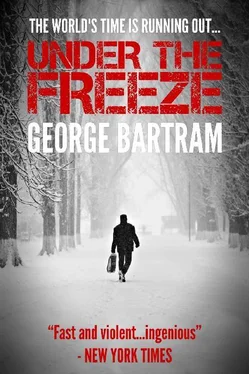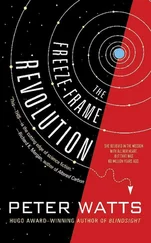“Ask at the post office store,” Tarp said.
“Oh, la, just like a bloody capitalist. I ain’t really your chauffeur, you know, ducks.”
“Ask at the store, Jenny.”
Harry Gossens lived in an attached house in a row of four behind the church, as if they had once been almshouses or even a school. The house looked clean and cared for, the small front yard given the excessive care of someone with not enough to do. Tarp rang and then waited a long, long time while the sounds of painful shuffling came toward him through the house.
“Yes?”
Harry Gossens was bent. His head was twisted a little to the left and his neck seemed unable to support it so that it hung forward. He had been a tall man when he stood straight.
“Mr. Gossens? Mr. Gossens, my name is Matthew Rider and I’m an author. I’m writing a book on one of your country’s great ships. I wonder if you can help me with some questions about HMS Loyal ?”
Mr. Gossens seldom closed his mouth. It made a constant, soft, interrogative circle at the bottom of his face, as if life had become so puzzling to him that he would never get enough answers to justify closing it. “I — I’m sorry.” He stared at Tarp. “I don’t hear well. You said your name is Rider?”
“Yes, Matthew Rider. I’m a writer.” He had meant to say author, because “Rider the writer” sounded funny. “I’m writing a book on the Loyal .”
“The Loyal .” Gossens considered that, gazing down at Tarp’s shoes. “A book, you say?”
“Yes, a book. About the Loyal .” Tarp had a story ready — that he had written several letters to Gossens and received no answer; that perhaps the naval office had given him the wrong address.
“Come in, come in,” Gossens said surprisingly. He gave a kind of ghastly chuckle. “No point in heating the whole outdoors, as my father used to say. Would your, um, young man care to come in?”
Tarp looked back toward the Humber, where Jenny was slumped against the fender. “No,” he said decisively.
They drank tea and ate a dark, heavy cake thick with fruit and some rather stale scones and a paste of mashed sardines. Gossens rustled this up by banging on the wall, a noise that brought the woman from the next house, who, he explained, “took care of him.” She came in twice a day and in emergencies like this one. “And the church is very good. Very good.”
“I’m sure.”
“Very good. Hot meals. Very good.” Mr. Gossens was a religious man. A Bible and a crucifix and two religious pictures were very prominent. He was not a dedicated navy man, as it turned out: he had joined the navy on the day Churchill had been made first lord in 1939, purely out of patriotism and a sure instinct for greatness. He had stayed in for thirty-six years because there was nothing he would rather have done. Now, his house had not a memento of those days.
“I had hoped you might be able to help me with the encounter with the Prinz von Homburg ,” Tarp said.
“There was a terrible thing, now.”
“Was it?”
“Terrible. So cold. I was snug in the navigation section, you know, not even having to go up to shoot readings, but those poor fellows out on the decks! We had ice on the ship as thick as — as I don’t know what. It was terrible. I think often about those poor Germans in the water, and us not able to help them. I pray about that still.”
“Why couldn’t you help them?”
“It was dark, and there was ice. It was quite peculiar. We’d broken out of the ice that afternoon, I remember it very clearly; there we were all of a sudden with open ocean. Oh, I was so glad to see it! Though you’d have died in minutes if you’d gone over, you know. Still, it looked so much more — more natural than the ice. We’d been trailing an icebreaker for two days, you know, with Homburg up ahead out of range, they said. It was terrible. The men used to come down from the deck watches with their faces frozen, some of them. They lost toes, fingers. I hate the cold, I always have. It was terrible.”
“You came out of the ice into the open ocean before you sank the Homburg ?”
Gossens chuckled. “Oh, I didn’t sink the Homburg . On a big ship, you know, Mr., um, Rider, you’re ever so faraway, and the guns go bang, and then by and by somebody says you’ve made a hit. There we were in the navigation section, closed in with charts and readings and gauges, you know, we might as well have been in London, I used to say. What was your question, sir? I’m so sorry… Ah, about the ice! Yes, we came out. That was why the navigation officers were so confused.”
“Because of the ice?”
“The water. We’d been proceeding mostly by dead reckoning — that’s a form of educated guessing — because we had no electronics down there, no Loran or any of that; and the weather was simply constant fog and cloud and snow, we hadn’t shot a star in days. Taken a reading, I mean — do you understand celestial navigation? It’s steering by the stars in very mathematical fashion. Well, we couldn’t do that. And dead reckoning had us deep in the ice, you know, and then we broke through into the open ocean, and the navigation officer and His Holiness — that was Admiral Pope-Ginna, we called him His Holiness; you see the pun, of course — you aren’t Roman Catholic, are you? I meant no offense — no, no, dear me… Where was I? Oh, there was quite a set-to. His Holiness was both ship’s captain and flag officer, and so his ship’s navigation was the example for the force. Well, we seemed to be scores of miles from where dead reckoning had us. There was a great row. Then one of our airplanes sighted the Homburg in the ice. It was sheer luck, they said. You know. War’s half luck, I think. Or God’s will, and we call it luck because we’re blind. Are you a religious man, Mr. Rider?”
“I’m afraid not.”
“Ah. You should be afraid indeed. No offense. ‘If the righteous know fear, what shall be in the hearts of the sinful and the ignorant?’ No offense.”
“How did they resolve the navigational problem?”
“Well, there was the battle, you see. We went right into battle formation, flank speed, off in a direction where the Homburg wasn’t supposed to have been, until the seaplane saw it. Then, they said, they got it on the radar and the guns started. It was night by then. Such a night as it was! I went up on deck for a moment, thinking to see something. Guns roaring, black as a cat’s belly, snow coming down, and somewhere off there was something they were supposed to be shooting at.”
“Did you know when they sank the Homburg ?”
“Well, we heard something of it. A hit, and so on. But as for sinking, you know, a capital ship doesn’t go down like a hammer you’ve dropped in the water. Some of them take days. The Homburg went quickly, as big ships go. It was gone by the morning, I mean.”
“And did you pick up survivors?”
Gossens was silent. “Too few. Too few.”
“Why?”
Gossens breathed heavily through his mouth. “They told us there were many, many icebergs. There was great fear we’d strike on one. That is not an idle fear down there, Mr. Rider. We did stay in the area another day and a night. But…” His voice trailed off. “Poor chaps. Even if they were Germans.” He looked appealingly at Tarp. “Do you believe the Germans are terrible men?”
“Some of them were then. Not the ones who died down there, I suppose. Not most of them.”
Gossens sighed. He was tiring, Tarp saw. Yet he was younger in years than Repin. It was important to Tarp to tie down the matter of the ship’s position as closely as possible. “About the navigational row.”
Читать дальше












